Stroke in Children
Medically reviewed by Drugs.com. Last updated on Jun 5, 2024.
A stroke happens when blood flow to part of the brain is interrupted. This can cause serious brain damage from a lack of oxygen. Brain function may be affected depending on where the stroke happens. A stroke can happen when your child is still in the womb, or at any age after birth. A stroke caused by a blood clot is called an ischemic stroke. A stroke caused by a burst or torn blood vessel is called a hemorrhagic stroke. Signs and symptoms of a stroke will depend on where in the brain it occurred. Signs and symptoms usually appear suddenly.
DISCHARGE INSTRUCTIONS:
Call your local emergency number (911 in the US) for any of the following:
- Your child has any of the following signs of a stroke:
- Numbness or drooping on one side of the face
- Weakness in an arm or leg
- Confusion or difficulty speaking
- Dizziness, a severe headache, or vision loss
-
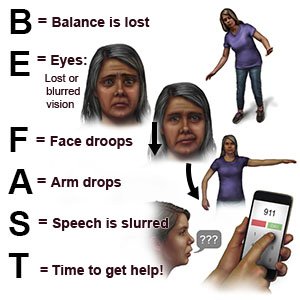
- Your child has a seizure.
- Your child feels lightheaded, short of breath, and has chest pain.
- Your child coughs up blood.
Seek care immediately if:
- Your child's arm or leg is warm, tender, and painful. It may look swollen and red.
- Your child has vision loss or a severe headache.
- Your child has trouble having a bowel movement or urinating.
Call your child's doctor if:
- You have questions or concerns about your child's condition or care.
Medicines:
Your child may need any of the following:
- Seizure medicine controls and prevents seizures.
- Blood thinners help prevent blood clots that can cause a stroke. The following are general safety guidelines to follow while your child is taking a blood thinner:
- Watch for bleeding and bruising. Watch for bleeding from your child's gums or nose. Watch for blood in your child's urine and bowel movements. Use a soft washcloth on your child's skin, and a soft toothbrush to brush his or her teeth. This can keep your child's skin and gums from bleeding. If your older child shaves, have him or her use an electric shaver. Do not let your child play contact sports.
- Tell your child's dentist and other healthcare providers that he or she takes a blood thinner. Have your child wear a bracelet or necklace that says he or she takes this medicine.
- Do not have your child start or stop any other medicines unless a healthcare provider tells you to. Many medicines cannot be used with blood thinners.
- Have your child take the blood thinner exactly as prescribed. Do not let him or her skip does or take less than prescribed. Tell your provider right away if your child forgot to take the blood thinner or took too much.
- Warfarin is a blood thinner that your child may need to take. The following are things you should be aware of if your child takes warfarin:
- Foods and medicines can affect the amount of warfarin in your child's blood. Do not make major changes to your child's diet while he or she takes warfarin. Warfarin works best when your child eats about the same amount of vitamin K every day. Vitamin K is found in green leafy vegetables and certain other foods. Ask for more information about what to give your child to eat while he or she is taking warfarin.

- Your child will need to see his or her healthcare provider for follow-up visits. He or she will need regular blood tests to decide how much medicine he or she needs.
- Foods and medicines can affect the amount of warfarin in your child's blood. Do not make major changes to your child's diet while he or she takes warfarin. Warfarin works best when your child eats about the same amount of vitamin K every day. Vitamin K is found in green leafy vegetables and certain other foods. Ask for more information about what to give your child to eat while he or she is taking warfarin.
- Antiplatelets , such as aspirin, help prevent blood clots. Give your child antiplatelet medicine exactly as directed. These medicines make it more likely for him or her to bleed or bruise. If you are told to give your child aspirin, do not give acetaminophen or ibuprofen instead.
- Give your child's medicine as directed. Contact your child's healthcare provider if you think the medicine is not working as expected. Tell the provider if your child is allergic to any medicine. Keep a current list of the medicines, vitamins, and herbs your child takes. Include the amounts, and when, how, and why they are taken. Bring the list or the medicines in their containers to follow-up visits. Carry your child's medicine list with you in case of an emergency.
Know the warning signs of a stroke:
The words BE FAST can help you remember and recognize warning signs of a stroke:
- B = Balance: Sudden loss of balance
- E = Eyes: Loss of vision in one or both eyes
- F = Face: Face droops on one side
- A = Arms: Arm drops when both arms are raised
- S = Speech: Speech is slurred or sounds different
- T = Time: Time to get help immediately
 |
Recovery testing:
Your child's healthcare provider will test your child's recovery 90 days (3 months) after the stroke. This may be done over the phone or in person. The provider will ask how well your child can do the activities he or she did before the stroke. The provider will also ask how well your child can do daily activities without help. Your child's provider may make recommendations for your child based on the test. For example, your child may need someone to help him or her walk safely. Your child may also need help with daily activities, such as getting dressed. Based on the answers, your child's provider may do this test again over time.
Take your child to rehabilitation (rehab) if directed:
Rehab is a program run by specialists who will help your child recover abilities he or she may have lost. Specialists include physical, occupational, and speech therapists. Physical therapists help your child gain strength or keep his or her balance. Occupational therapists teach your child new ways to do daily activities. Your child's therapy may include movements for everyday activities. A speech therapist helps your child improve the ability to talk and swallow.
Make your home safe for your child:
Your child may have trouble walking or keeping his or her balance after a stroke. The following can help lower the risk for falls:
- Remove anything your child might trip over.
- Keep paths clear throughout your home. Tape electrical cords down so your child does not trip on them.
- Make sure your home is well lighted.
- Put nonslip materials on surfaces that might be slippery. An example is your bathtub or shower floor. Help your child get into and out of the shower or bathtub.
- Help your child use assistive devices, if needed. Your child may need to use a walker or cane. He or she may also need devices to help with daily activities.
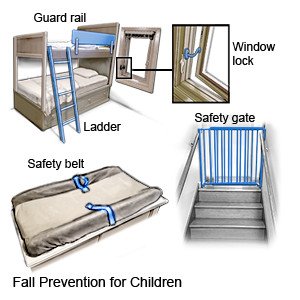 |
Help prevent a stroke in your child:
Help your child create healthy habits to continue as an adult. This can help prevent risk factors that may lead to a stroke. After a stroke, your child is at increased risk for another stroke. It is important to help your child lower his or her risk as much as possible. Your child's healthcare provider can tell you more about the following:
- Manage your child's health conditions. A condition such as diabetes can increase your child's risk for a stroke. Control your child's blood sugar level if he or she has hyperglycemia or diabetes. Make sure your child takes his or her prescribed medicines and checks blood sugar levels as directed.
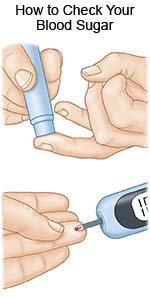
- Check your child's blood pressure if directed. High blood pressure can increase the risk for a stroke. If your child has high blood pressure, follow directions for controlling it.
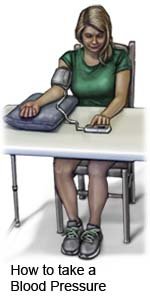
- Offer your child a variety of healthy foods. Healthy foods include whole-grain breads, low-fat dairy products, beans, lean meats, and fish. Your child should eat at least 5 servings of fruits and vegetables each day. Offer foods that are low in fat, cholesterol, salt, and sugar. Choose foods that are high in potassium, such as potatoes and bananas. A dietitian can help you create healthy meal plans.

- Have your child exercise as directed. Activity is important for preventing a stroke. Exercise also helps control blood pressure and weight. Children and teenagers should get at least 60 minutes of physical activity each day. It may help to make exercise a family activity. Find an activity or exercise your child enjoys.
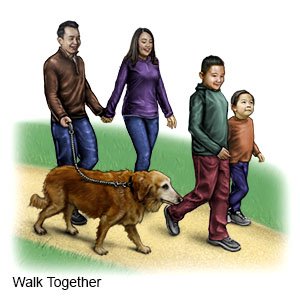
- Help your child maintain a healthy weight. Ask your healthcare provider what a healthy weight is for your child. Ask the provider to help you create a weight loss plan, if needed. Providers can help you and your child break weight loss into small goals if your child has a lot of weight to lose.
- Talk to your teenager about not smoking. Nicotine and other chemicals in cigarettes and cigars can increase the risk for a stroke. Ask healthcare providers for information if your teen currently smokes and needs help to quit. E-cigarettes or smokeless tobacco still contain nicotine. Talk to providers before he or she uses these products.
Follow up with your child's doctor as directed:
Your child may need to come in for regular tests of his or her brain function. Write down your questions so you remember to ask them during your visits.
For support and more information:
- American Stroke Association
Phone: 1- 888 - 478-7653
Web Address: http://www.stroke.org
© Copyright Merative 2024 Information is for End User's use only and may not be sold, redistributed or otherwise used for commercial purposes.
The above information is an educational aid only. It is not intended as medical advice for individual conditions or treatments. Talk to your doctor, nurse or pharmacist before following any medical regimen to see if it is safe and effective for you.
Learn more about Stroke
- Atorvastatin (Lipitor): Top 12 Drug Facts You Need to Know
- Should you mix muscle relaxants with alcohol?
Treatment options
- Medications for Cerebral Thrombosis/Embolism
- Medications for Cerebrovascular Insufficiency
- Medications for Hemorrhagic Stroke
- Medications for Ischemic Stroke
Care guides
Symptoms and treatments
Further information
Always consult your healthcare provider to ensure the information displayed on this page applies to your personal circumstances.
